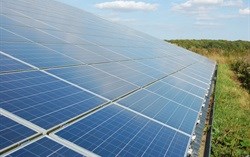Renewable energy is Africa's power supply solution
Africa's renewable energy potential is mostly untapped and it offers a great opportunity for the continent to address its power shortage with sustainable energy sources. This is according to Ntlai Mosiah, head of Power, Infrastructure & TMT for Corporate Banking at Standard Bank.

© leuchtturm2013 - Fotolia.com
"While renewable energy cannot solve Africa's power shortage on its own, we believe that distributed power from renewables, such as solar PV, can make a great contribution towards solving the energy shortage that currently plagues parts of the continent," Mosiah says.
The 48 sub-Saharan countries have a combined installed power generation base of only 68 gigawatts (GW), roughly equal to the capacity of Spain whose population is less than 5% that of sub-Saharan Africa. Moreover, almost two thirds of sub-Saharan Africa's total installed power generation base is situated in South Africa, the continent's biggest economy.
Cost benefit
Renewable energy's suitability for Africa is underscored by the fact that it can now compete on cost with some conventional energy sources. The cost benefit of renewable energy is exemplified by the fact that users of diesel generation on the continent currently pay between 60 and 70 US cents per kilowatt hour (kWh) compared with an estimate cost of up to 10 to 15 US cents per kWh for wind generation and up to 15 to 25 US cents for solar PV.
Furthermore, Africa has the hydroelectric capability of 1,888 terawatt hours a year (TWh/yr), of which about 41% (or 774TWh/yr) is situated in the Democratic Republic of the Congo on the Congo River. Ethiopia's Blue Nile also has potential hydroelectric capacity of 260TWh/yr, while Cameroon has 115TWh/yr and Madagascar has 180TWh/yr. To put that in context, Russia's entire renewable energy production in 2011 was estimated at 166.6TW/yr.
Some of the best solar irradiation potential is also located in Africa, where many countries receive an average of 325 days per year of sunlight. The west coast of Africa has substantial wind generation capacity, where wind speeds sometimes exceed a very high 11m/s, while nations along the East African Rift hold considerable geo-thermal potential.
Coal vs renewables
Although South Africa's 50-million people enjoy almost two thirds of the total installed base of power in sub-Saharan Africa with approximately 40 000MW, the country intends bringing 18GW of renewables capacity online by 2020 and has awarded 2.4GW of power purchase contracts through the first two windows of its procurement programme.
"Questions have been raised about whether renewable energy might be too expensive for Africa given the abundance of cheap coal, but it is now clear that this has changed as the cost of renewable technology is steadily falling while the capital expenditure costs of coal-fired power stations are rising," says Mosiah. "The relatively cheap power that South Africa currently enjoys is largely due to the historic low cost base of power stations built some 30 years ago. Those same power stations built today would be far more expensive to construct."
Investment by fund managers
South Africa's effort to reduce its reliance on coal-fired power generation is likely to see an increasing number of fund managers selectively investing in renewable energy projects in the rest of sub-Saharan Africa, whose 800-million people get by on just 25,000MW. Interest is being fuelled not only by the need of institutional investors to meet environment and sustainability targets in their mandates, but by internal rates of return which can match or exceed other comparable investments made by private equity.
"Standard Bank believes Africa will follow the international trend to boost renewable energy's contribution to national grids as sub-Saharan African nations step up efforts to alleviate their chronic power shortages," said Mosiah. "That will make for some very compelling investment opportunities for institutions that wish to capitalise on Africa's scramble for reliable and sustainable power."